Survivalists have a definite “thing” for big sticks. Caught in an unexpected situation, one of their first orders of business is to find or cut a large stick that can serve as a hiking staff, club, fishing pole, or even a spear. Beyond those specific functions, a big chunk of wood is also just a comforting thing to have when you’re facing the unknown.
No matter how creative you are, though, a stick plucked from nature is still only a stick. While it can certainly help you keep your balance on uneven terrain and give you a fighting chance against both two- and four-legged predators, its résumé pretty much ends there. To wring more function out of it, you need a better, “purpose-designed” stick like the Crawford Survival Staff.
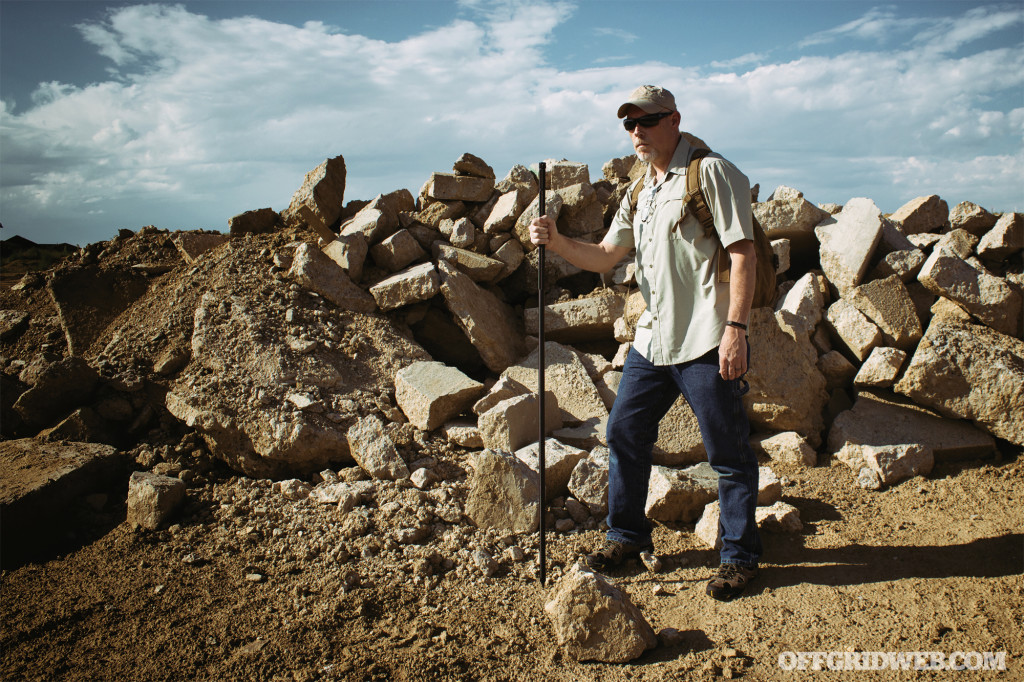
As the brainchild of legendary custom knifemakers Pat Crawford and his son Wes, at first glance, the Survival Staff appears to be nothing more than a high-quality hiking staff made from aluminum instead of wood. In reality, it’s an incredibly versatile, completely modular survival system that offers functionality far beyond a humble stick.
Survival Staff Basics
Pat Crawford developed the original Survival Staff nearly 30 years ago and its brilliantly simple design is still unrivaled in today’s market. Hand-crafted one at a time from hardened, black-anodized aluminum, it consists of a two-piece body, a steel point, an aluminum handle and cap, a 440C stainless steel blade, a rubber crutch tip, and a soft rubber grip. When all these parts are assembled together, they yield a 57-inch hiking staff that conceals the 440C stainless steel blade within the upper section like a sword cane. The bottom section, provides on-board storage space for survival supplies and accessories — as well as other unique functions (more on that shortly). The real genius of the design, however, comes through when you start mixing and matching all those parts.
Meticulously machined threads at the ends of the various components of the staff allow them to be rearranged and screwed together in different configurations. Unscrew the handle, remove the blade, and replace the handle cap with it and the staff becomes an instant spear. Remove the top section of the staff and screw the handle into the lower tube to create a 38-inch walking cane for urban environments. Detach the handle and upper tube from the lower tube and you’ve got a skull-busting 24-inch baton/swagger stick and a fully functional 33 3/8-inch blowgun.
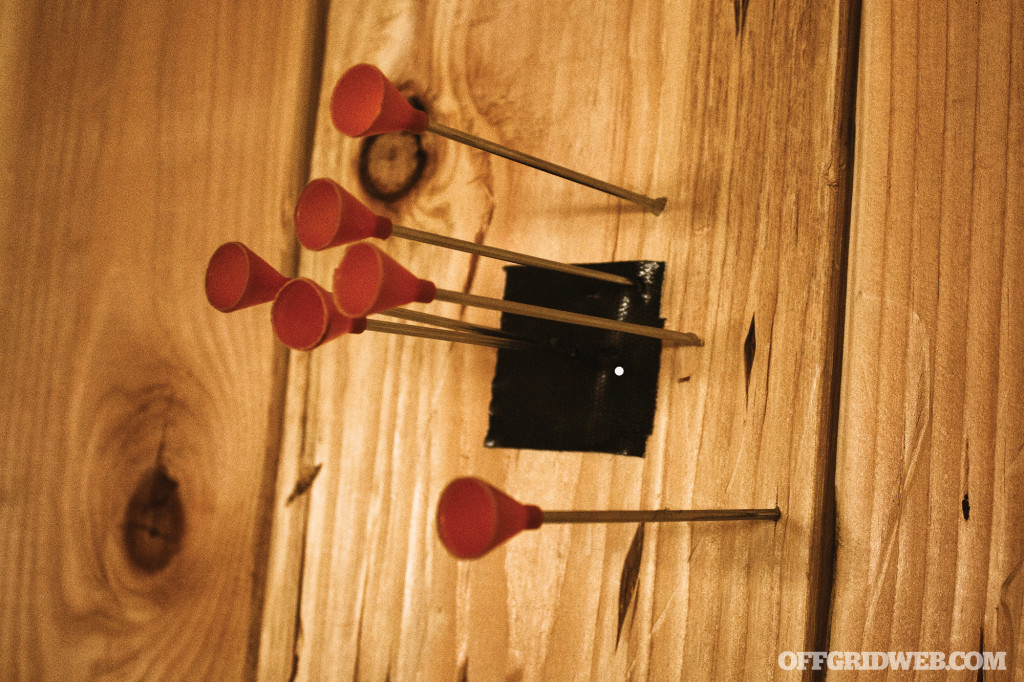
This group was shot from 7 yards. Small game beware.
All the screw-together joints of the Survival Staff feature O-ring seals that keep the parts from working loose and ensure that everything remains watertight. The screw engagement of all the parts is also extremely robust and ensures impressive strength in every joint. Strategically placed knurling provides non-slip surfaces on all key areas and makes assembly and disassembly of the parts a breeze without the need for tools.
In its basic configuration, the Survival Staff is a seriously stout hiking staff that also makes a kick-ass impact weapon. Although its on-board blade’s narrow profile and thick grind don’t make it a full-service survival knife, it still provides impressive cutting capability for most chores. When mounted as a spear blade, it’s also far more robust than the typical “lash-a-knife-to-a-stick” survival spear and can be assembled that way in under a minute. Although it’s not recommended as a throwing weapon, as a stabber, it’s very formidable.
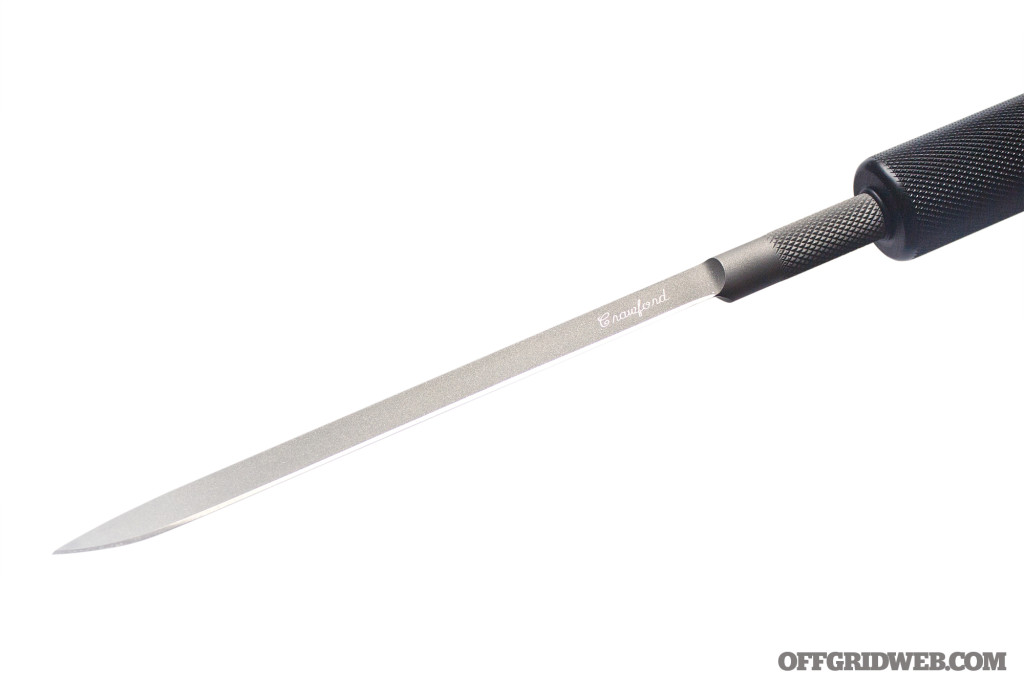
Because the tube sections are joined by a solid threaded coupling, they cannot be used together as a blowgun; the longer lower section works best. Its .61-caliber bore is polished smooth to reduce friction and sized to accommodate modified .625-caliber commercial darts now manufactured by Cold Steel. Made from heavy steel nails with injection-molded plastic cones, these darts, in conjunction with the staff’s large bore size, are the most efficient way of maximizing ballistic performance in a short-barreled blowgun.
Within reason, a larger bore allows you to get more breath into the blowgun’s tube faster, generating more power and velocity. Smaller tubes (.38 and .40-caliber) compress your breath, but often fail to harness all of it. Blowgun bores of .50 to .625 are the real sweet spot, especially with heavier darts that hit with greater authority. If your stalking skills are good enough to get you close to small, tasty animals, the Survival Staff’s blowgun can help you stay well fed. You can also store up to eight 4 3/8-inch darts in the staff’s lower tube.
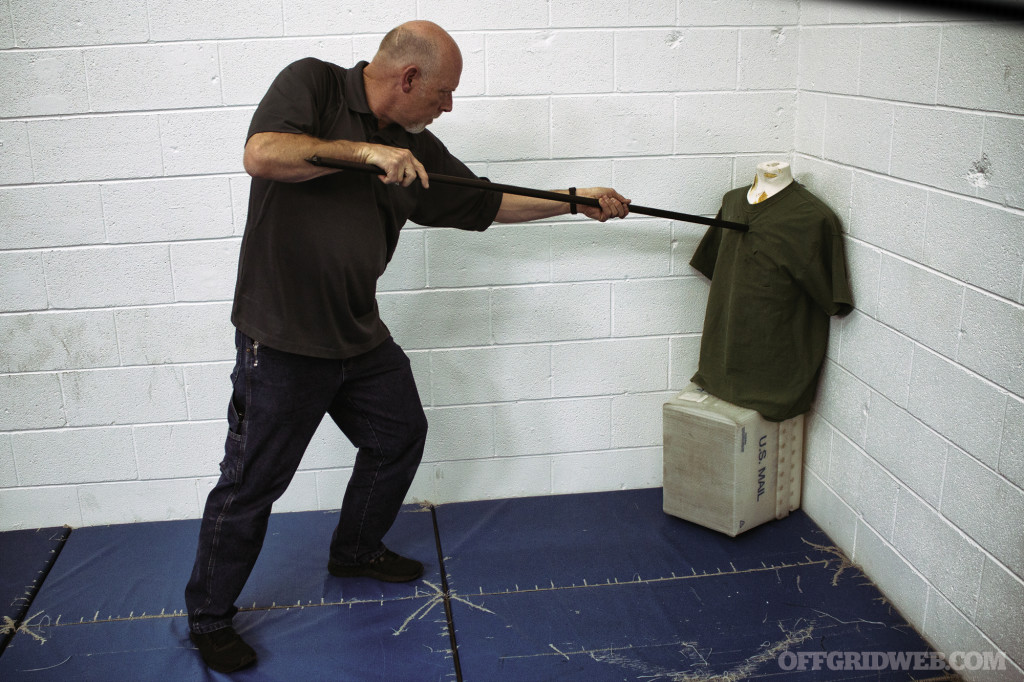
We tested the Survival Staff’s spear on a foam mannequin. The blade penetrated completely with very little effort.
The Dave Canterbury Package
The Survival Staff’s LEGO-like modular design has made it a favorite of serious survivalists for decades. It has also sparked countless ideas for other components and bolt-on parts that make it even more versatile. When noted survivalist Dave Canterbury got his hands on one a few years ago, he not only loved it, but began designing additional components for it.
Canterbury felt that the standard blade on the staff was too narrow and preferred something with a wider profile and better edge geometry. Although it wouldn’t store within the staff, it could be a more versatile cutting tool and, in its role as a spear blade, would create a large enough wound channel to tackle larger game, including wild boar and deer.
Wes Crawford responded by creating the Missile Spear Point/Neck Knife, an all-steel knife that works in concert with the staff. By itself, the Missile is a compact, double-edged neck knife that rides in a Kydex sheath with a small fire starter. Its blade is beveled on only one side and its twin cutting edges are both about 70-percent serrated.
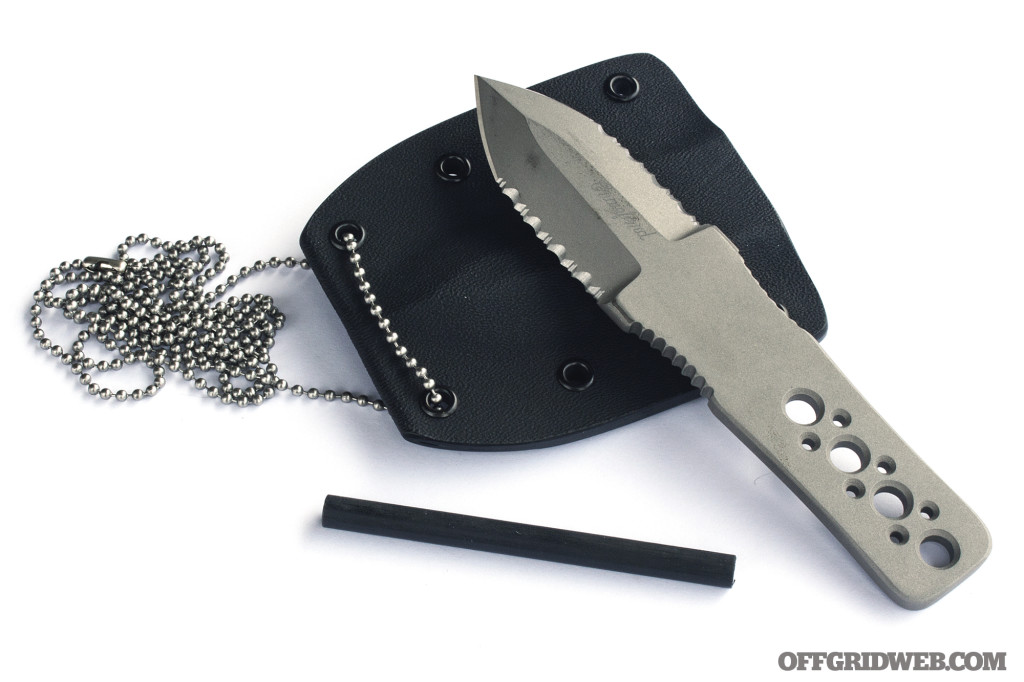
Above: One optional accessory Crawford Knives offers is the Missile Neck Knife, which can also be used as a potent spear tip for the staff. It comes in a Kydex neck sheath with a fire starter.
Only 5.5 inches overall, the Missile knife provides instant access to a cutting tool without having to disassemble the staff. Holes in its skeletonized handle allow it to be attached to a stout stainless steel adapter using two slotted machine screws. Screwing the adapter into the end of the staff converts it into a serious double-edged spear.
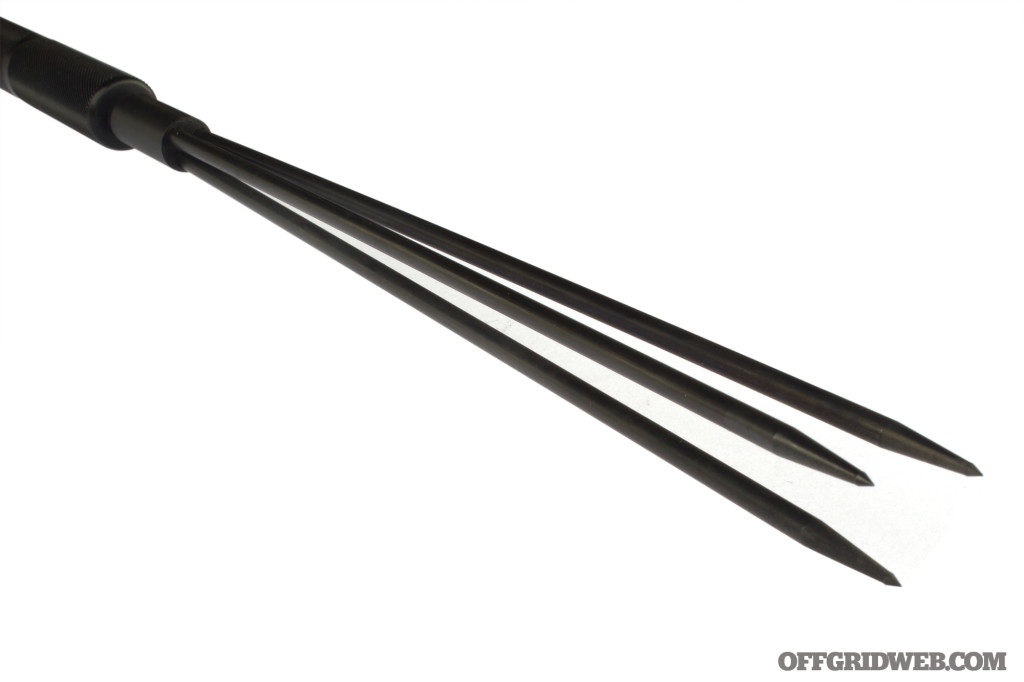
Optional 3-pronged spear head
By eliminating the standard blade, Canterbury also freed up space inside the staff for storing other accessories, including a Firesteel fire starter and a three-pronged spearhead for taking fish in shallow waters. Because the staff’s steel tip, threaded coupling, and head all have matching internal threads, these accessories can be attached to any one of them for secure, rattle-free storage that leaves the rest of the staff’s internal real estate available for other items.
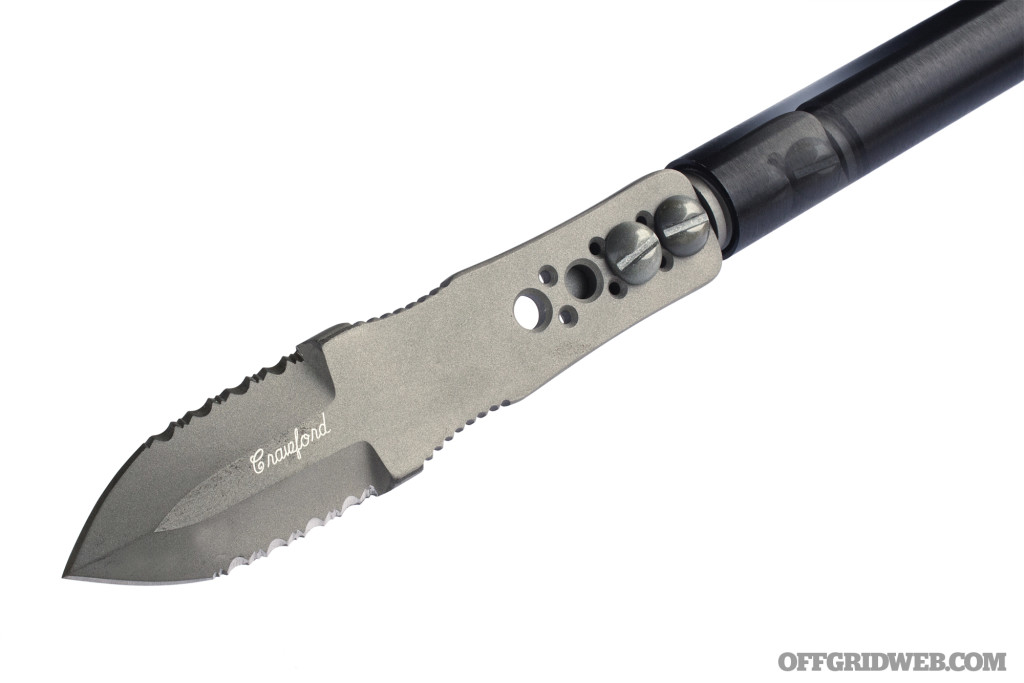
Missile knife mounted to the Survival Staff as a spear
Other Accessories
Every serious survivalist fine-tunes his gear to meet his individual needs and skills. That kind of personalization fits perfectly with the Crawford Survival Staff’s modular design concept. As more and more of their staffs got into the field, Pat and Wes began receiving requests for other components that either store within the staff or, like the Missile Neck Knife, can be carried as a complement to it.
Like a giant hollow-handled Rambo survival knife, the Survival Staff’s roughly 15 cubic inches of internal storage space can house a surprising amount of gear if it’s properly organized. Pat and Wes offer that organization in the form of a set of watertight plastic test tubes that can be filled with matches and tinder, water purification tablets, powdered drink mixes, medication, fishing tackle, hand sanitizer, and anything else small enough to fit into them. They also offer accessory kits with micro-sized flashlights, miniature lighters, fire starters, and whistles, all sized to ride inside the staff.
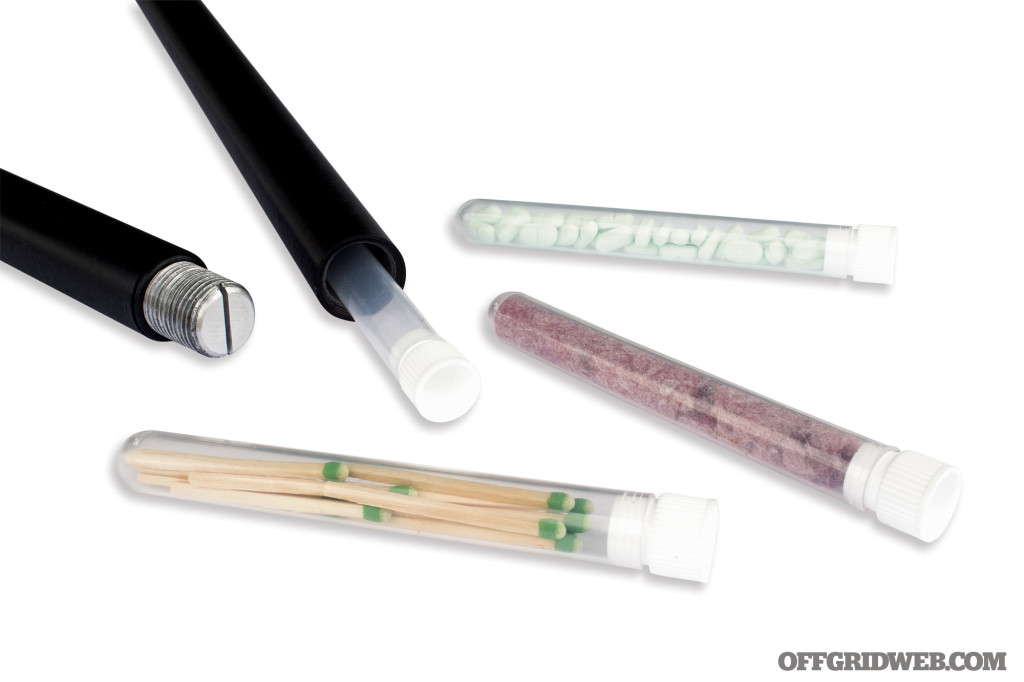
Optional storage test tubes
The stock handle section, which rides at the top of the staff and typically serves as the grip for the blade, is made of knurled aluminum. If you prefer something heavier that hits harder, Crawford sells an optional stainless steel version. Want a T-handled grip for the shorter “urban” configuration? No sweat; they offer that too. If your survival food plans include picking not-so-low-hanging fruits and nuts, they even make a “gaff” hook that attaches to the top end of the staff.
Many preppers consider a slingshot to be a very viable survival weapon. If you fall into that camp, Pat and Wes also have you covered. Their handcrafted slingshot design is made from hardened 440C stainless steel and surgical rubber tubing. Although it can be shot very effectively “as is,” its handle is also skeletonized to fit the same adapter as the Missile Neck Knife/Spear Point. The adapter provides an improved grip and allows the entire assembly to be attached to the top of the staff, where its leather-wrapped fork can also be used as a shooting rest. And if you’re into slingshots, don’t forget that you can also store your ball bearing ammo in the storage tubes inside the staff’s shaft.
Genius or Gimmick?
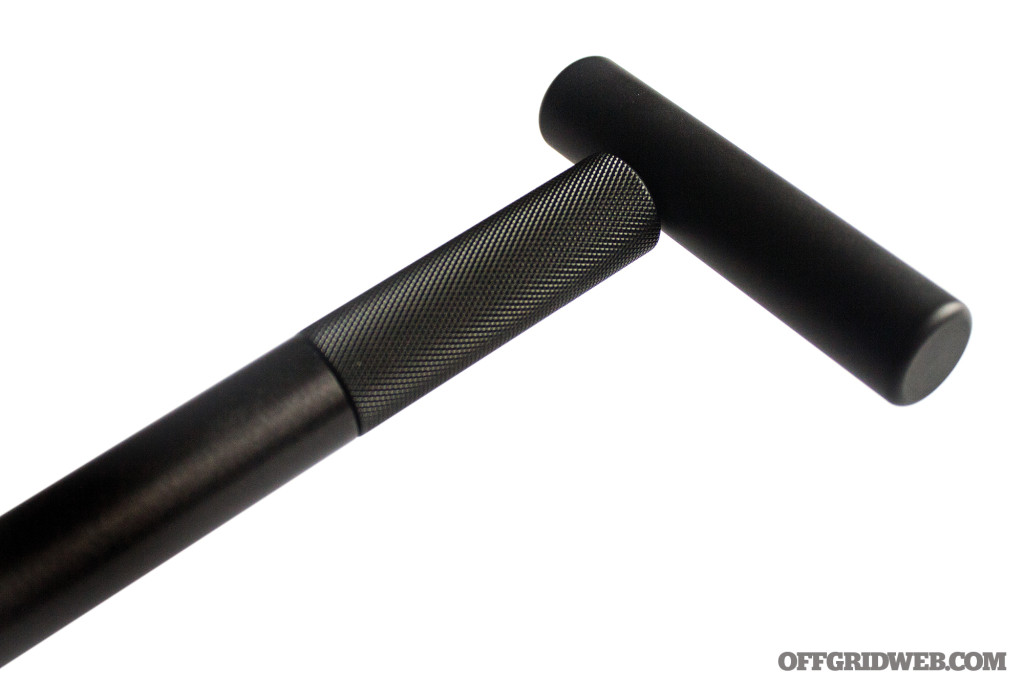
Optional T-Grip attachment
Like any tool, the real utility of the Crawford Survival Staff lies in your ability to make it and its components perform the tasks you need when you need them. Because it’s a modular system that you can configure, its ability to meet those needs is quite impressive. As a hiking staff or walking stick, it helps you keep your balance on any kind of terrain, makes a potent impact weapon, and provides on-board storage for a comprehensive survival kit.
Its standard blade, while not a full-service survival knife, is sharp, strong, and amazingly useful. It also transforms the staff into a real-deal spear in a matter of seconds. Similarly, the staff’s blowgun function is legit and shoots with serious authority and accuracy. In fact, in chronograph and penetration tests, it easily rivaled purpose-designed blowguns, including some with longer tubes. Depending upon your personal needs, skill set, and budget, you can selectively add options to your staff with Crawford’s wide range of bolt-on accessories, or put your own ingenuity to work and go the DIY route.
My first exposure to the Survival Staff was way back in 1991 when an Army buddy of mine bought one. As an avid knife collector, I was very familiar with Pat Crawford’s work and was blown away by the staff’s handmade quality, but I still wasn’t sure it was worth the price. Almost 30 years later, my buddy is long retired from active duty and has logged literally thousands of miles hiking with that staff. It’s still going strong and he wouldn’t part with it for anything. ’Nuff said.
Crawford Knives Survival Staff Specifications
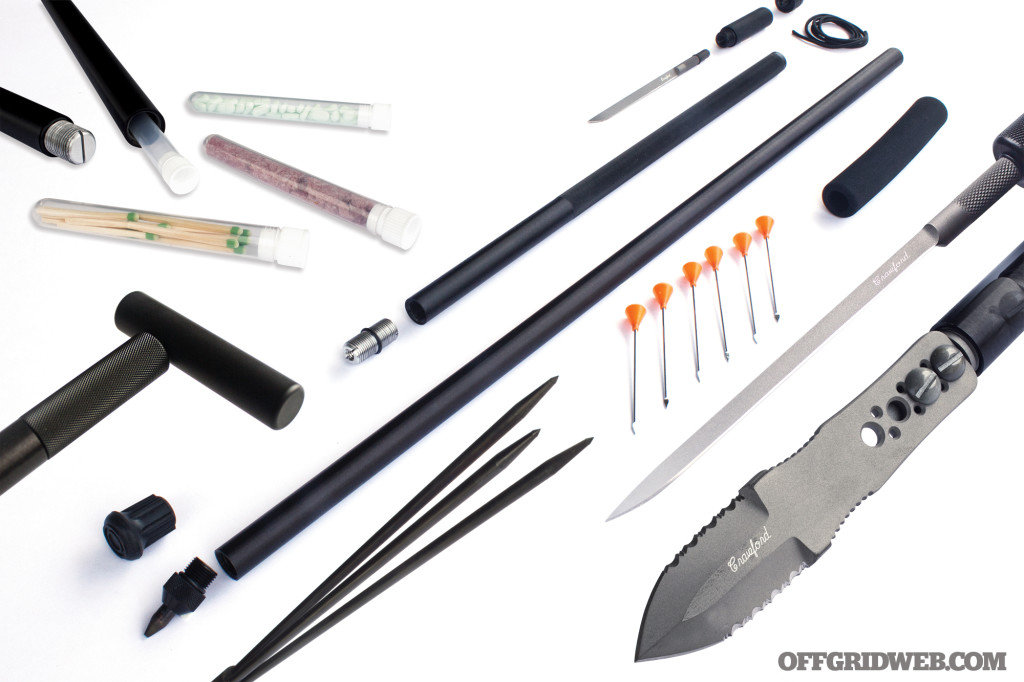
For hunting fish in shallow water, Crawford offers an optional three-pronged spear head. It can also be stored within the staff when not in use. The interior of the staff offers quite a bit of on-board storage space. The optional test tubes help keep survival items separated, dry, and organized. The T-Grip attachment is paired with the heavy steel replacement handle for a hard-hitting combination. When the standard blade is attached to the top end of the handle, the Survival Staff instantly becomes a formidable spear.
Overall Length
57 inches
Weight
29 ounces (standard model with blade and six blowgun darts)
MSRP
$349
URL
www.crawfordknives.com
Read More
Subscribe to Recoil Offgrid's free newsletter for updates, offers and more.
The post Review: Crawford Survival Staff appeared first on RECOIL OFFGRID.
https://www.offgridweb.com/gear/review-crawford-survival-staff/
 CampingSurvivalistHuntingFishingExploringHikingPrivacy PolicyTerms And Conditions
CampingSurvivalistHuntingFishingExploringHikingPrivacy PolicyTerms And Conditions
